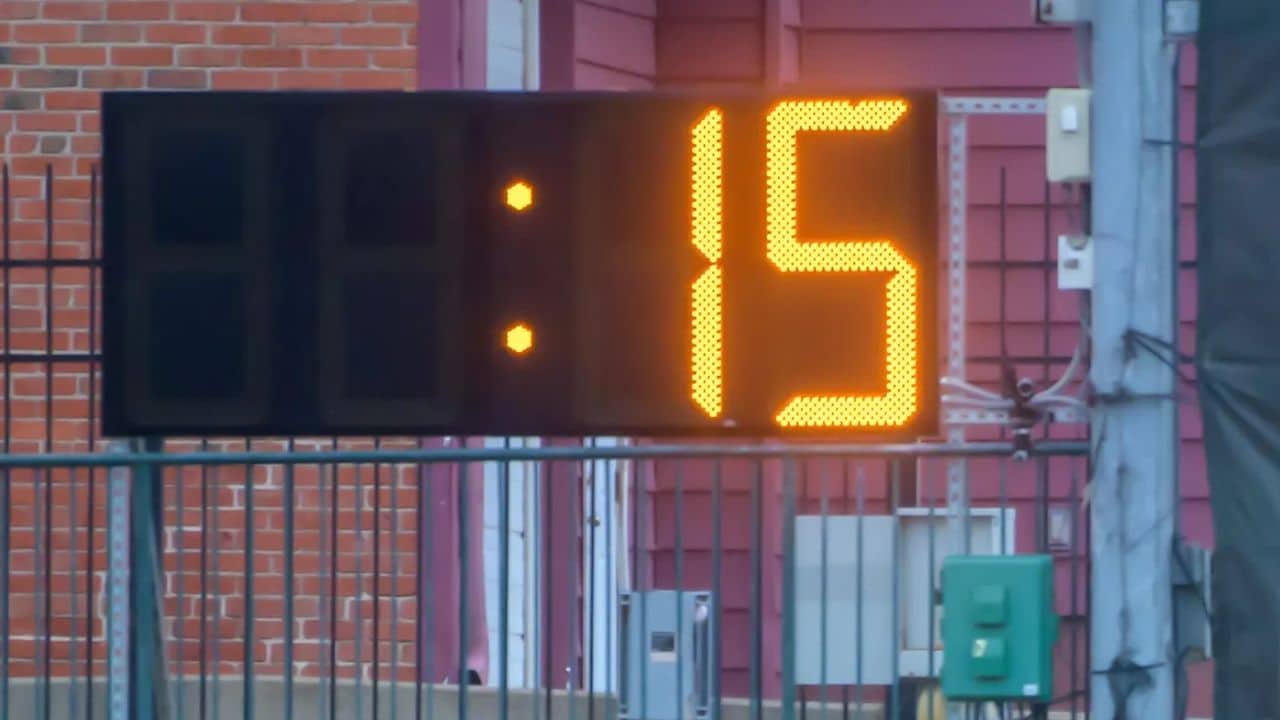The Major League Baseball MLB is making some major change in the rules particularly the introduction of a pitch clock for the 2023 season, find out all the details about the new rules and the penalty
MLB have decided to add the pitch clock rule as a measure to address pace-of-play issues in the league.
MLB new pitch clock rules for 2023 season explained, violation penalty and timeout rule
This is baseball in 2023 😳
Tied game. Bases were loaded. Bottom of the 9th. Full count . . . ends with pitch clock violation.
*The commentators freaking out is what really makes this 👌😂@BravesOnBally | @Braves #Braves #MLB
— Bally Sports (@BallySports) February 25, 2023
The pitch clock, bigger bases, and banning the shift are all coming to Major League Baseball in 2023.
Morgan Sword, @MLB's Executive Vice President of Baseball Operations, says the league is excited about the rule changes, and you should be too. pic.twitter.com/VqR3d5o4OX
— MLB Network Radio on SiriusXM (@MLBNetworkRadio) September 14, 2022
Last season, the average game time in the MLB was three hours and six minutes, which marked the 11th consecutive season where game times averaged over three hours. Before 2011, game times reportedly averaged over three hours only once, in 2000.
The pitch clock rule
Prior to it addition to the MLB, the pitch clock timer was initially implemented in the minor leagues. So far, it has proven successful as has shortening game times to a big extent. Back in the 2022 season, Minor league games averaged two hours and 38 minutes. However, following the introduction of the pitch clock it went down from three hours three minutes in 2021.
MLB pitch clock rules for 2023 season
The MLB has featured different time limits for the pitch clock depending on the situation:
- 15 seconds with no runners on base
- 20 seconds with runners on
- 30 seconds between batters
Moreover, there are different rules for the each player given below:
- Batters must be placed in the batter’s box and ready to hit with eight seconds left
- Catchers must be in the catcher’s box with nine seconds remaining
- Pitchers must be in their leg kick by the time the pitch clock hits zero
Penalties for violating pitch clock
There are several penalties for violating the pitch clock stated below, which can have a big impact on an at-bat:
- If a pitcher is not in full motion by the time the clock hits zero, the batter wins an automatic ball
- If a catcher is not in the box with nine seconds, the batter wins and automatic ball
- If a batter is not ready at eight seconds, officials will assess an automatic strike
Timeout rules for pitchers and batters
Given below are the various timeout rules for both batters and pitchers:
- Pitchers will be allowed two “disengagements” per plate appearance. Pickoff moves or stepping off the mound will count as a disengagement
- Pitchers need to ask for a new ball within eight seconds remaining on the clock, and may also face penalty for asking repeatedly
- Batters get one timeout per at-bat
Expected game reduction time
Although the exact changes of the pitch clock will be seen over the course of the season, fans can expect some major changes. In the MiLB, following the introduction of the pitch clock, game times saw a reduction of 25 minutes. Game times in 2021 were three hours and three minutes, while it was two hours and 38 minutes in 2022.
The MLB can also expect a similar reduction in the 2023 season, where over three hours has continued to be the average game time for a season.
Will umpires have control over the pitch clock?
The Umpires will have the choice to change the pitch clock whenever necessary. One of the main reasons for a change would be an Injury. Injuries could involve a batter getting hit or a catcher taking a foul ball in bad spots.
Whenever a fielder goes significantly out of position after making a certain play, the Umpire can extend the clock in such a situation as well.
Quirky pitcher deliveries
Much to delight of fans and some players, the MLB will allow and encourage pitchers to deliver quirky deliveries as long as they are part of their game. However, pitchers like Luis Garcia of the Astros, will no longer be able to perform his “rock the baby” windup. Garcia will not be able to go into his leg kick before the clock hits zero and could face penalty.
Meanwhile, players like Nestor Cortes of the Yankees, will still be able to do his wibbly-wobbly leg kick. This is because Nestor will already be in his motion by the time the clock hits zero. As per the rules, the ball doesn’t have to be traveling to the plate when the pitch clock hits zero, as long as the pitcher is in his motion.



